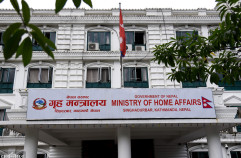Spokesperson of the government, the minister says - 'IGP's tongue should be bitten'

We use Google Cloud Translation Services. Google requires we provide the following disclaimer relating to use of this service:
This service may contain translations powered by Google. Google disclaims all warranties related to the translations, expressed or implied, including any warranties of accuracy, reliability, and any implied warranties of merchantability, fitness for a particular purpose, and noninfringement.

Highlights
- But the question - who stopped the police adjustment for 7 years?



Even for seven years since the country went into federal practice, the basic laws for distribution of rights, responsibilities and manpower have not been made. However, government spokesperson Prithvisubba Gurung has given a public response that the Inspector General of Police (IGP) should hold his tongue for non-cooperation in police adjustment. With the opposition to the objectionable expression of the minister, a new debate has started about the inevitability of the federalism implementation law.

Gurung, who is also the deputy general secretary of UML, the second largest party in parliament, was the guest speaker at a program held by Press Chautari in Pokhara on Saturday. Accusing the Inspector General of non-cooperation in police adjustment, he made objectionable statements. Gurung, who has also been the Chief Minister of Gandaki province for about three and a half years, reviewed the state of the provincial governments and said, 'A government without employees, police administration and civil servants is not a government. It is in place, many people from the same sector are obstructing.'' What did the police IGP say now? He says that he will not enforce this law. Can you speak like that or not? His tongue should have been bitten, I told him. The head of an organization cannot speak against the government's policies and regulations. I heard that he said that he will not bring the Police Act. The Federal Police Act should be brought in line with the relevant federal laws. We will continue that process, he said.
From February 2074, Nepal formally went to federal structure and practice. Gurung became the first Chief Minister in Gandaki when seven provincial governments were formed in seven provinces. At that time, Gurung's party UML and Maoists formed a coalition government from the union to the state. In the union, there was a government of almost two-thirds under the leadership of CPN leader KP Sharma Oli. However, in the meantime, the basic law related to Nepal Police has not been made, and the government has not made regulations, guidelines and procedures according to the laws made in the meantime.
According to the constitution made in 2072, after the country went to a federal structure from 2074, in February 2076, the parliament made two laws related to the police. The Act on Adjustment of Nepal Police and State Police and the Law on Operation, Supervision and Coordination of Nepal Police and State Police have been passed and certified on February 28, 2076. However, even five years after the law was made, regulations, guidelines and procedures have not been made.
For police adjustment, the then Oli-led Cabinet conducted an Organization and Management (O&M) survey on police adjustment on October 27, 2077, and established the total number of police personnel in the union and state at 79,532. In which Nepal (Federal) Police had 24 thousand 812 personnel and 54 thousand 720 personnel in seven provinces. However, if the Oli government did not proceed with the further process, Congress's Sher Bahadur Deuba and Maoist's Pushpa Kamal Dahal, who then became prime ministers, also did not prioritize police adjustment.
The meeting of the National Coordination Council, the coordinating body between the Union and the provinces, was held in Pokhara on June 16, a year ago under the chairmanship of the then Prime Minister Dahal. The day before that, on June 15, the inter-province chief minister's meeting held in Pokhara decided to put pressure on the union to implement the law, including adjustments. The 17-point joint letter passed by the meeting was submitted by the Chief Ministers to the Prime Minister.
The then government had committed to bring the provincial police structure under the provincial government both legally and practically from January 2080. However, after the work did not proceed accordingly, on December 13, the Chief Ministers of all the seven provinces met in Hetounda. They issued a 9-point manifesto pressuring the union to adjust the police force, but there was no hearing.
Even though the Police Adjustment Act was enacted in 2076, the Nepal (Federal) Police Act was not enacted, so the police adjustment and provincial police laws are also inactive. The manpower of the federal structure called Nepal Police will be deployed in the province. It is said that one level of police going from the union to the state will be promoted. However, there is no law to determine the service conditions, service period and age of Nepal (Federal) Police. It is not possible to send the police to the province until that basic law is made," says an officer of the Nepal Police. However, the government is delaying making the basic law. This confusion has stopped the adjustment.'
After trying to make a law about the service period and age limit, the government has not accelerated it either. Even recently, some police officers went to the court saying that the current service and conditions provisions are illegal. The government went into a vacancy after the Supreme Court ordered not to continue the 30-year period. The Supreme Court has returned to the status quo after hearing. In this context, the police officer says, 'Police is a law-enforcement body, so many other laws come together with it, and it must be decided by Parliament.' All provinces have opposed it. The Madhesh government has filed a case against the union in the Supreme Court, saying that the constitutional rights have not been transferred to the state government. Former Home Secretary Umesh Mainali, who is also the former chairman of the Public Service Commission, comments that those who were using single authority yesterday did not take it easy when distributing the powers according to the federal structure and as a result of that, no law has been made according to the federal system. Says, 'Naturally, the distribution of rights may not be easy for those who are using a single right, saying that the leaders who do not make laws cannot escape responsibility, they are the ones who are responsible for it.' They say that the necessary laws should be brought. "It has been almost a decade since the constitution was issued, 7 years have passed since the government structure was changed according to federalism, but if the laws have not come till today, then we have to understand that there are problems in the jurisdictions of the Union and the provinces that were decided yesterday," Sharma said to Kantipur, "Now the laws according to the interests and needs of the country The parties should work towards making it. Before approving the bill by the cabinet, the government should hold extensive discussions with the stakeholders and experts and include the expert's suggestions. Former Home Secretary Mainali said that the statement given by the government spokesperson and senior minister by defaming the Inspector General of Police is objectionable and it is a dehumanization of the entire national service.
Mainali says that it is true that the police leadership is uncomfortable with the Act on Police Adjustment and Operations passed by the Parliament. This Act has already been passed by the Parliament, it is true that the police leaders did not take it easy on the issues passed by the Parliament, but the government did not bring regulations and other laws related to it until all these years after the Act was passed? Is it the government's fault or the police chief's fault for not bringing regulations after the parliament made the law?' Mainali said, 'The prime minister should seek an explanation from the communication minister for making such an expression. If necessary, he should be removed from the position.
Sharma, the former head of the National Investigation Department, also said that Minister Gurung's expression towards the Inspector General of Police was indecent and objectionable. "Government's spokesperson imposing such indecent and objectionable statements on the head of the law enforcement agency because the law has not been enacted cannot be considered correct in any way. Minister Gurung should apologize and correct this statement, otherwise the Prime Minister should ask for an explanation," Sharma told Kantipur.
Not only the Nepal Police Act, other important laws related to the operation of federal and state governments have also not been made. In particular, the laws related to the service, conditions and operation of the civil administration, Nepal Police and Armed Police Force (APF) have not been made yet. Because of this, there is a disagreement between the union and the state government on the distribution of rights, the deployment of employees and security personnel and the disbandment.
 प्रकाशित : भाद्र १७, २०८१ ०५:१६
प्रकाशित : भाद्र १७, २०८१ ०५:१६

 २६.१२°C काठमाडौं
२६.१२°C काठमाडौं














